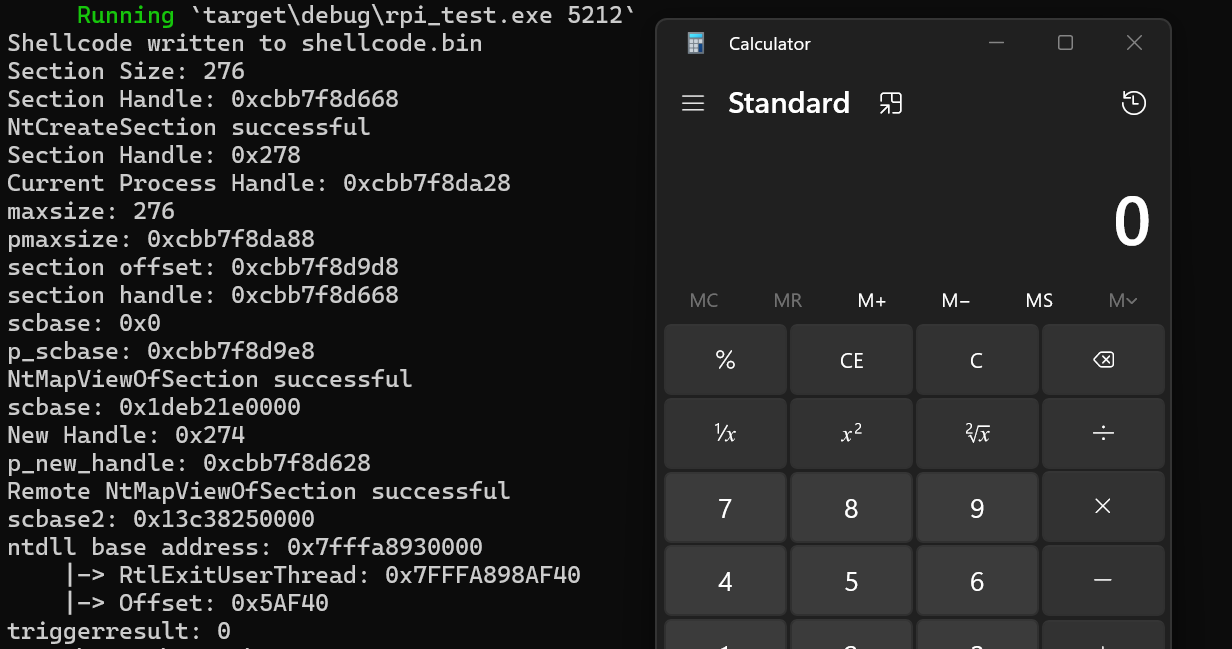RPI is a Rust library that provides low-level process injection capabilities for Windows systems. It offers a set of functions to interact with Windows APIs, particularly focusing on NT APIs, to perform process manipulation and code injection. It was written for use in the Tempest c2 project, but can be used independently.
- Dynamic resolution of Windows API functions
- Memory allocation and manipulation in remote processes
- Shellcode injection into remote processes
- Utility functions for working with Windows DLLs and functions
Add this to your Cargo.toml:
[dependencies]
rpi = { git = "https://github.com/Teach2Breach/rpi.git" }example using from your own program:
use rpi::*;
fn () main {
//
// function signature: pub fn injection(mut new_handle: HANDLE, shellcode: &[u8])
let result = injection(new_handle, &scode);
//
}For a complete example of how to use this library, please refer to the main.rs file in the repository. It demonstrates how to inject shellcode into a target process using the RPI library. If you want to test it out, you can run cargo run <pid> and it will pop calc.
The example in main.rs also writes the shellcode to a file called shellcode.bin. The reason for this is because the rpi library is expecting shellcode not a file path, so that it can be easily used by implants reading from a buffer in memory. So for the demo, we write the shellcode to a file, then read it into a buffer and use that as the shellcode input. So this is just to simulate handing the c2 server a file, and having it pass the shellcode to the rpi library (in implant memory). The library itself does not write to disk.
The RPI library does not include a function to obtain a process handle. This is intentional, allowing users to implement their preferred method of handle acquisition based on their specific needs and security considerations.
The main.rs file in this repository provides an example of how to obtain and duplicate a process handle using the following Windows APIs:
NtGetNextProcessGetProcessIdDuplicateHandleGetCurrentProcess
This example demonstrates one possible approach to acquiring a handle to the target process. Users are encouraged to review this implementation and adapt it to their specific requirements or implement their own handle acquisition method.
Remember that the injection function in the RPI library expects a valid process handle as one of its parameters. Ensure that you have the necessary permissions and have properly obtained a handle to the target process before calling the injection function.
These APIs are accessed through dynamic resolution to avoid direct imports, using the following functions from the Windows API:
LdrGetDllHandleLdrGetProcedureAddress
If you want to avoid using those functions, you can use dinvoke_rs or check my noldr repo for resolving functions from a PEB walk.
RPI uses the following steps for process injection:
- Create a section object using
NtCreateSection - Map the section into the current process with
NtMapViewOfSection - Copy the shellcode into the mapped section 'std::ptr::copy_nonoverlapping'
- Map the section into the target process with
NtMapViewOfSection - Create a suspended thread in the target process with
NtCreateThreadEx - Queue an APC to the suspended thread with
NtQueueApcThread - Resume the thread with
NtAlertResumeThread - Wait for the thread to complete using
NtWaitForSingleObject
While copy_nonoverlapping doesn't call Windows APIs directly, it's worth noting that the Windows kernel provides a function called RtlCopyMemory, which is essentially equivalent to memcpy. However, Rust's standard library implementation doesn't use this Windows-specific function.
Much of this code was originally based on UrbanBishop:
https://github.com/FuzzySecurity/Sharp-Suite/blob/master/UrbanBishop/Program.cs
https://github.com/FuzzySecurity/Sharp-Suite/blob/master/UrbanBishop/BerlinDefence.cs
